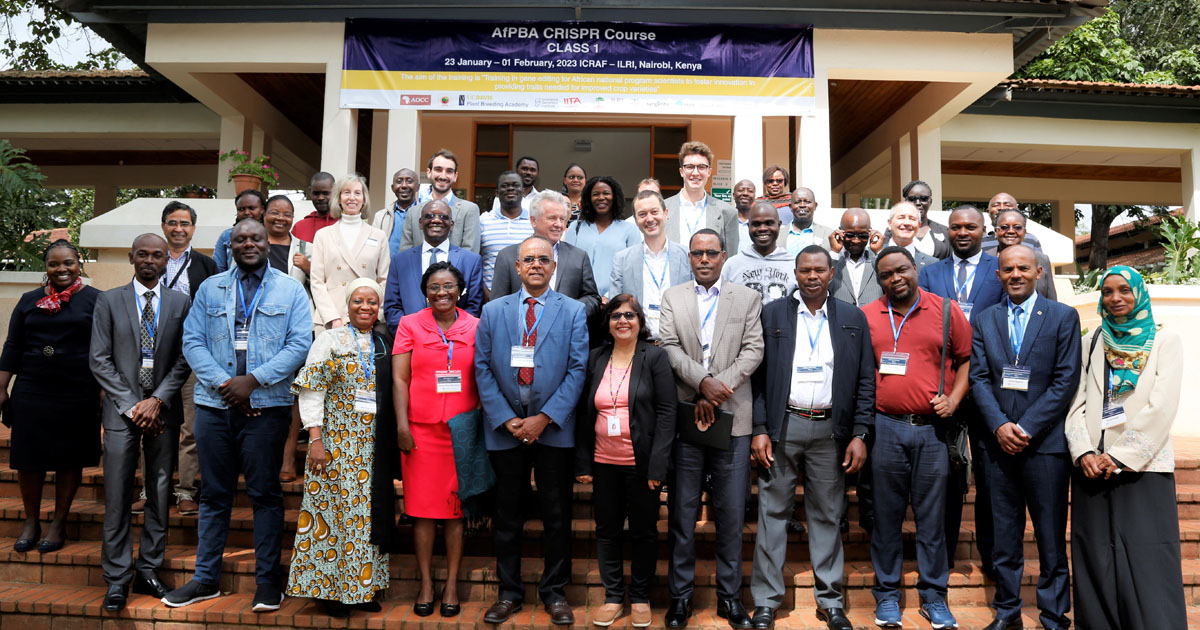
Media advisory
Nairobi, 26 January 2023 – Climate change is making it harder to grow enough nutritious food, but a unique programme is training African scientists in harnessing a cutting-edge breeding tool to adapt agriculture to new threats.
The African Plant Breeding Academy, a programme for top plant breeders to upgrade their skills in advanced crop breeding, is training 11 doctorate-level scientists from across the continent to use CRISPR (Clustered Regularly Interspaced Short Palindromic Repeats), a tool that allows scientists to make precise and specific changes to DNA sequences in living organisms, including crops.
The technology will help plant scientists to quickly develop crop varieties adapted to the changing climate, and to boost their nutritional content for important vitamins and minerals like Zinc, Iron and Vitamin A, all of which are critical for human health and development.
As an initiative of the African Orphan Crops Consortium (AOCC), the University of California of Davis organised the six-week training programme, partnering with UC Berkeley’s Innovative Genome Institute (IGI) and the International Institute for Tropical Agriculture (IITA) which is hosted in Nairobi, Kenya by the Center for International Forestry Research and the World Agroforestry (CIFOR-ICRAF) and the International Livestock Research Institute (ILRI). Additional partners include African Union Development Agency – New Partnership for African Development (AUDA-NEPAD), Morrison and Foerster, Bayer, Syngenta, UM6P Ventures, and the Foundation for Food and Agricultural Research (FFAR).
“We are honoured to be working with the top institutions in the world in this Academy that will enable Africans to drive innovation critical to improving African crops to eliminate stunting due to malnutrition,” said Dr Allen Van Deynze, Director of the Seed Biotechnology Center at UC Davis and Scientific Director of the AOCC.
“This training is the first of its kind to impart knowledge, skills and tools to accomplish gene editing in crop plants to national program scientists in Africa,” said Dr Rita Mumm who oversees Capacity Building and Mobilisation at the AOCC and directs the African Plant Breeding Academy.
Eleven doctorate scientists from seven countries are participating in this first cohort, from a highly competitive applicant pool of 57. The scientists work at institutions that are already undertaking research in gene editing in crop plants or have committed to doing so upon their employee’s graduation from the course.
“The gene-editing toolkit training is a momentous occasion that should be celebrated given the scale of the problem that CRISPR is expected to address,” said AOCC founder Dr Howard-Yana Shapiro during the official launch of the training programme.
“CRISPR is a key strategy towards improving food nutrition in Africa and the trainees from this programme will be the change agents that will make the impossible happen especially with the kind of pan-African collaboration we have witnessed today.”
Dr Silas Obukosia from the African Union Development Agency – New Partnership for African Development (AUDA-NEPAD) emphasised the organisation’s support for gene editing as one of the key innovations that will transform the continent.
“Gene-edited crops and their products that are equivalent to conventionally bred crops should be regulated under the conventional seed laws,” said Dr Obukosia. “Gene editing makes specific, targeted changes to the DNA of an organism and can be programmed to produce products equivalent to those developed through conventional breeding. In contrast, techniques used to develop GMOs often involve introducing genetic material from distantly related organisms to develop traits of economic importance.”
The programme supports the United Nations’ Sustainable Development Goal 2 (SDG2), which aims to end hunger, achieve food security and improve nutrition as well as promote sustainable agriculture by 2030.
“It’s a step in the right direction,” said World Agroforestry Interim Director General Dr Ravi Prabhu, adding that, “addressing nutrition by improving local skillsets through such a programme is key to improving food security on the continent and an important contribution to a productive and sustainable transformation of African agriculture.”
For more information please contact:
Susan Onyango
Global Communications Coordinator
Nairobi, Kenya
Tel: +254 700 299 227
Email: s.onyango@cifor-icraf.org













